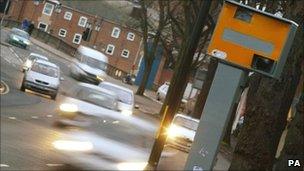Most police forces adopt new speeding guidelines
- Published
- comments

The changes mean more drivers would be offered the option to do a speed awareness course
Most police forces in England and Wales have adopted new speeding guidelines that allow motorists to do up to 86mph and avoid points on their licence.
It means drivers can pay to do a speed awareness course instead, if caught at up to 10% above the limit plus 9mph.
At a meeting of the Association of Chief Police Officers in January, it was announced that 37 out of 44 forces had signed up to the new system.
Critics say the rules are a money-making exercise and allow law breaking.
'Educational experience'
Previously, only those travelling at up to 10% above the limit plus 6mph could be offered one of the courses.
But the amendments were agreed by chief constables at a meeting of the Association of Chief Police Officers in January.
For a 30mph zone, the upper limit for a speeding course would be 42mph.
This would rise to 86mph for motorways and other major roads, although the official limit remains the same.
Acpo said the figure at which a course could be offered was a decision for individual forces, and not all would make it available for higher speeds.
Drivers can only attend one speed awareness course, costing between £60 and £100, in a three-year period.
"There is evidence to show that if people are sent on educational courses, rather than being punished with a fine and penalty points on their driving licence, they are less likely to reoffend in the future," an Acpo spokeswoman said.
"Clearly if someone is breaking the speed limit outside a school when the children are coming out at 3.15pm, it's a no brainer and they would be punished. But if it is 3am and there's no-one on the streets, there is a degree of discretion."
'A chance to reflect'
But Joel Hickman, spokesman for road safety charity Brake, said the new proposals "sent out the wrong message" and were "simply a way of making money" - a charge denied by Road Safety Minister Mike Penning.
"Many people drive for work and would rather pay £100 to go on a course than accumulate points and risk losing their licence, so it is quite clear which is the greater deterrent to speeding," said Mr Hickman.
"It sends out a message that it's ok to speed, which it certainly is not. Speeding causes tragedy every day on British roads and results in a huge number of people being killed and seriously injured. It's also a factor in a quarter of all crashes.
"If you hit a child at 30mph, it's the equivalent of that child falling out of a three storey building. Driving at 42mph would mean that child having no chance of survival."
But Mr Penning insisted road safety is the government's "top priority". "We support the targeted use of educational courses where these are shown to have a positive effect," he said.
"The police are responsible for the administration of these courses but we are clear that course fees should not be used to raise revenue."
'Get-out-of-jail-free card?'
The Institute of Advanced Motorists said it supported "the widening of the bandwidths that allow drivers to choose a speed awareness course over a fine".
"We don't feel it gives a 'get-out-of-jail-free card' - drivers can only attend one speed awareness course in a three-year period, so repeat offenders will still be hit with points on their licence," said chief examiner Peter Rodger.
But a spokeswoman for accident prevention charity Rospa said while speed awareness courses give people "a chance to reflect on why they speed", the new proposals "would need to be monitored to make sure they are having the same effect on higher-end speeders as on so-called 'accidental speeders'".
Police forces not signed up to the new guidelines are: Dorset, Durham, Hampshire, Humberside, Wiltshire, the Metropolitan Police and City of London. Five of these have their own speed awareness schemes.
At the start of the month, speed cameras across Oxfordshire were switched back on eight months after they were turned off.
Funding was withdrawn for 72 cameras and 89 mobile sites last August as part of budget cuts in the county.
But police said deaths and serious injuries on the area's roads went up following the cameras being switched off.
Money for the cameras to be introduced has come from speed awareness courses and backroom savings.
- Published1 April 2011
- Published24 November 2010
- Published2 November 2010
- Published10 August 2010